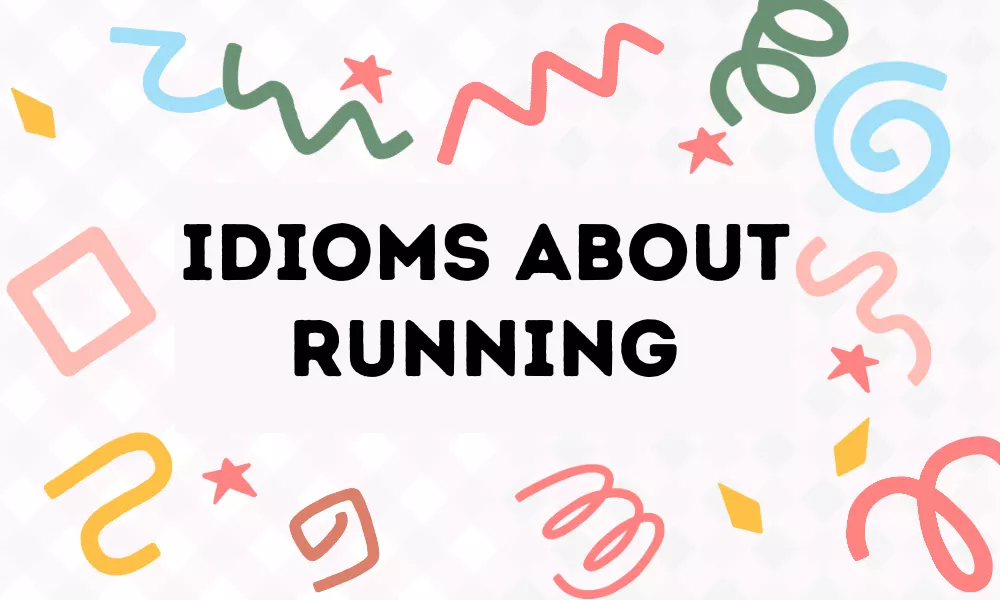Idioms About Running – Expressions With Meanings & Examples

Running isn’t just about moving fast but it’s a powerful metaphor for life itself. We all “run” toward goals, “run into” problems, or even “run out of” time. In English, the word “run” appears in countless idioms that capture everything from energy and ambition to exhaustion and escape. These idioms don’t always talk about physical movement, instead they express our daily struggles, successes, and emotions in creative ways. Whether you’re aiming to sound more fluent, understand native speakers better, or simply make your conversations livelier, these phrases will help you keep pace.
What Are Idioms about Running?
Idioms about running are expressions that use the word “run” to describe actions, feelings, or situations that aren’t always related to actual running. These idioms often reflect movement, speed, progress, or effort in life. For example, when someone says they’re “running out of time,” it doesn’t mean they’re physically running but it means time is almost finished. Such idioms help make language more vivid and meaningful, allowing us to express ideas about work, emotions, and everyday challenges in a creative and natural way.

Commonly Used Idioms about Running
- Run out of time
Meaning: To have no more time left to finish something.
Example: We ran out of time before completing the project. - Run late
Meaning: To be delayed or behind schedule.
Example: Sorry, I’m running late for the meeting. - Run into someone
Meaning: To meet someone unexpectedly.
Example: I ran into my old teacher at the mall yesterday. - Run out of money
Meaning: To spend all your money.
Example: We ran out of money before the trip ended. - Run away
Meaning: To escape or leave suddenly.
Example: The dog ran away from home. - Run a business
Meaning: To manage or operate a business.
Example: She runs a small bakery downtown. - Run behind schedule
Meaning: To be slower than planned.
Example: The train is running behind schedule today. - Run the show
Meaning: To be in charge or control everything.
Example: After the manager left, Sarah ran the show. - Run smoothly
Meaning: To go well without problems.
Example: The event ran smoothly from start to finish. - Run out of breath
Meaning: To become tired from physical activity.
Example: He ran up the stairs and ran out of breath. - Run on empty
Meaning: To continue working despite exhaustion.
Example: After studying all night, I’m running on empty. - Run its course
Meaning: To reach a natural end or conclusion.
Example: Their friendship ran its course over the years. - Run cold
Meaning: To lose enthusiasm or interest.
Example: His passion for painting ran cold after college. - Run the risk
Meaning: To take a chance that something bad might happen.
Example: You run the risk of failure if you don’t prepare. - Run errands
Meaning: To do small everyday tasks outside the home.
Example: I spent the morning running errands downtown. - Run out of patience
Meaning: To stop being patient.
Example: I’m running out of patience with your excuses. - Run deep
Meaning: To be strong or intense.
Example: His loyalty to his family runs deep. - Run your mouth
Meaning: To talk too much or carelessly.
Example: Stop running your mouth and start working. - Run for office
Meaning: To campaign for a political position.
Example: She decided to run for mayor next year. - Run in the family
Meaning: A trait or quality that many family members share.
Example: Musical talent runs in their family. - Run through something
Meaning: To quickly review or rehearse.
Example: Let’s run through the plan one more time. - Run across something
Meaning: To find something by chance.
Example: I ran across an old photo album in the attic. - Run dry
Meaning: To be used up or exhausted.
Example: My creativity has run dry this week. - Run out of luck
Meaning: To no longer have good fortune.
Example: After three wins, he finally ran out of luck. - Run scared
Meaning: To act afraid of losing something.
Example: The company is running scared after new competition. - Run parallel
Meaning: To happen at the same time or in a similar way.
Example: Their careers have run parallel for years. - Run into trouble
Meaning: To experience problems.
Example: We ran into trouble with the new software. - Run the numbers
Meaning: To calculate or check financial figures.
Example: Let’s run the numbers before finalizing the deal. - Run wild
Meaning: To behave uncontrollably.
Example: The kids ran wild during recess. - Run hot and cold
Meaning: To change moods or opinions frequently.
Example: He runs hot and cold when it comes to commitment. - Run for cover
Meaning: To seek protection from danger.
Example: Everyone ran for cover when it started raining. - Run the gamut
Meaning: To include a wide range of things.
Example: Her emotions ran the gamut from joy to sorrow. - Run short of something
Meaning: To not have enough of something.
Example: We’re running short of paper in the printer. - Run on fumes
Meaning: To keep going with very little energy left.
Example: After a 10-hour shift, I’m running on fumes. - Run a tight ship
Meaning: To manage something efficiently and strictly.
Example: The boss runs a tight ship at the office. - Run counter to
Meaning: To be in opposition to something.
Example: His beliefs run counter to traditional values. - Run circles around
Meaning: To outperform or outdo someone easily.
Example: She runs circles around her classmates in math. - Run for it
Meaning: To escape quickly.
Example: The thief saw the police and ran for it. - Run with the idea
Meaning: To develop or expand on a suggestion.
Example: That’s a good concept, let’s run with the idea. - Run through money
Meaning: To spend money quickly.
Example: He runs through money like water. - Run a fever
Meaning: To have an elevated body temperature.
Example: The child is running a fever, so keep him home. - Run up a bill
Meaning: To accumulate expenses.
Example: He ran up a huge bill at the hotel. - Run a red light
Meaning: To drive through a traffic signal illegally.
Example: The driver was fined for running a red light. - Run the gauntlet
Meaning: To face a series of challenges or criticisms.
Example: New leaders often run the gauntlet of public opinion. - Run roughshod over
Meaning: To act without regard for others’ feelings.
Example: He ran roughshod over his coworkers’ opinions. - Run thin
Meaning: To become scarce or weak.
Example: My patience is running thin today. - Run down
Meaning: To lose energy or become weak.
Example: My phone battery ran down during the call. - Run across one’s mind
Meaning: To think of something briefly.
Example: The idea just ran across my mind this morning. - Run after someone
Meaning: To chase or pursue someone.
Example: She’s always running after fame and attention. - Run for your life
Meaning: To escape from danger very quickly.
Example: The villagers ran for their lives when the storm hit.
Rare and Unique Idioms about Running
- Run with the pack
Meaning: To follow the crowd or act like everyone else.
Example: He’s not one to run with the pack; he prefers to stand out. - Run aground
Meaning: To encounter an obstacle or failure.
Example: The plan ran aground due to financial issues. - Run to seed
Meaning: To become neglected or less attractive over time.
Example: The old house has really run to seed. - Run to form
Meaning: To behave or perform as expected.
Example: The team ran to form and won easily. - Run riot
Meaning: To act freely without control.
Example: Imagination ran riot during the art class. - Run to ground
Meaning: To find or capture after a long search.
Example: The detective finally ran the suspect to ground. - Run one’s course
Meaning: To continue until the end naturally.
Example: The illness must run its course before recovery. - Run rings around
Meaning: To outperform someone by a large margin.
Example: The rookie ran rings around his older competitors. - Run with scissors
Meaning: To take dangerous or foolish risks.
Example: Investing all your savings in one stock is like running with scissors. - Run the table
Meaning: To win every contest or game.
Example: The champion ran the table in the tournament.
Read: Idioms For Teaching
Running Idioms in Literature and Pop Culture
- Run for your life
Meaning: Urgent escape from danger; often used in action movies.
Example: “Run for your life!” shouted the hero as the building collapsed. - Run the world
Meaning: To be powerful or in control; made popular by Beyoncé’s song Run the World (Girls).
Example: She works hard and dreams to run the world someday. - Run the race
Meaning: To keep striving toward a goal; common in inspirational literature.
Example: Life is not about winning but running the race with faith. - Run wild
Meaning: To act freely without restraint; seen in The Great Gatsby.
Example: “Let’s run wild before youth slips away,” he said. - Run on empty
Meaning: Continuing despite exhaustion; common in motivational talks.
Example: After three nights of studying, I’m running on empty. - Run away with your heart
Meaning: To fall deeply in love too quickly; used in romance novels.
Example: Don’t let your emotions run away with your heart. - Run the show
Meaning: To be in charge; often used in workplace dramas.
Example: After the boss left, she ran the show her own way. - Run out of luck
Meaning: To lose good fortune; a classic line in movies.
Example: “Looks like you’ve run out of luck, cowboy,” said the villain. - Run through the night
Meaning: To continue tirelessly; a metaphor used in songs and poetry.
Example: The melody ran through the night, haunting and beautiful. - Run from your past
Meaning: To avoid facing one’s mistakes or history.
Example: In many novels, the hero learns you can’t run from your past.

Synonyms and Alternatives about Running
| Synonym | Meaning |
|---|---|
| Sprinting | Moving at full speed over a short distance; symbolizes urgency or quick action. |
| Dashing | Moving suddenly and quickly; often suggests excitement or determination. |
| Racing | Competing or moving fast; often used to describe speed or competition. |
| Jogging | Running at a slow, steady pace; used for relaxation or steady progress. |
| Hurrying | Moving or acting quickly to save time; suggests urgency. |
| Escaping | Running away from danger or a problem; implies avoidance or fear. |
| Rushing | Moving with great speed and little care; shows haste or pressure. |
| Galloping | Moving like a fast-running horse; used metaphorically for rapid progress. |
| Fleeing | Running away to avoid capture or trouble; common in dramatic or fearful contexts. |
| Speeding | Moving extremely fast; often implies both literal and metaphorical quickness. |
Tips for Using Running Idioms in Writing and Speech
- Match the Idiom to the Emotion
Use running idioms that fit the feeling of your message; for example, “running out of time” for stress, or “run wild” for freedom. This makes your writing emotionally vivid. - Use Them in Metaphors and Stories
Blend running idioms naturally into storytelling or analogies. For instance: “Success isn’t a sprint; it’s a marathon.” This adds rhythm and depth to your message. - Don’t Overuse Them
While idioms add color, too many can sound forced. Sprinkle them strategically, especially in key moments of your writing or speech. - Adjust for Tone and Audience
Some idioms sound casual (“run your mouth”), while others fit formal contexts (“run the risk”). Choose according to your audience and setting. - Combine with Action Verbs
Pair running idioms with dynamic verbs to energize your writing. Example: “She ran through the data and sprinted toward a solution.” It gives your language movement and life.
Read: Idioms About War
Read: Idioms About Teeth
FAQs
Conclusion
Running idioms aren’t just about physical speed because they reflect life’s energy, ambition, and challenges. Whether you’re running late, running the show, or running out of patience, these expressions add excitement and emotion to your language. Learning and using them helps you sound more natural, confident, and fluent in English. By understanding these idioms, you can express ideas about work, emotions, and daily life in creative ways that connect with native speakers.
